2023.3.16
How to write a resume that passes the document screening
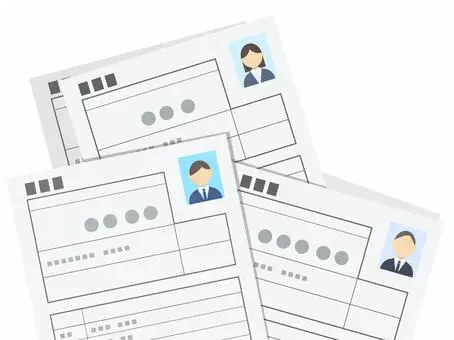
When applying for a position with a company in Japan, you must submit your resume and work history in Japanese.
With the application documents, the applicant will proceed to the document screening process, the first round of interviews, and the second round (final interview).
It is necessary to pass the document screening process in order to proceed to the interview.
In order to pass the screening process, it is necessary to appeal to the company by the application form.
This article explains in detail how to write a resume.
If you are writing a resume for the first time, or if you are a foreigner who does not have a good screening rate, please read this article and use it as a reference.
How to write a Japanese Resume
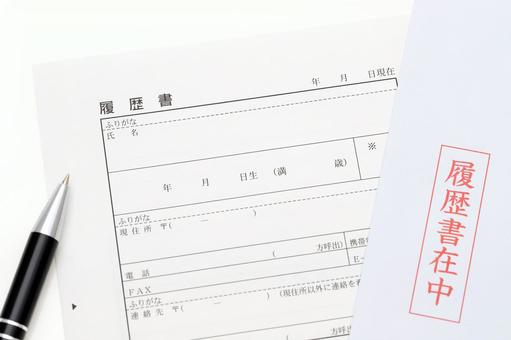
Any resume format is fine.
Word, Excel, handwritten letters, etc. are all fine.
You can download a resume from the Internet and use it.
Personal information
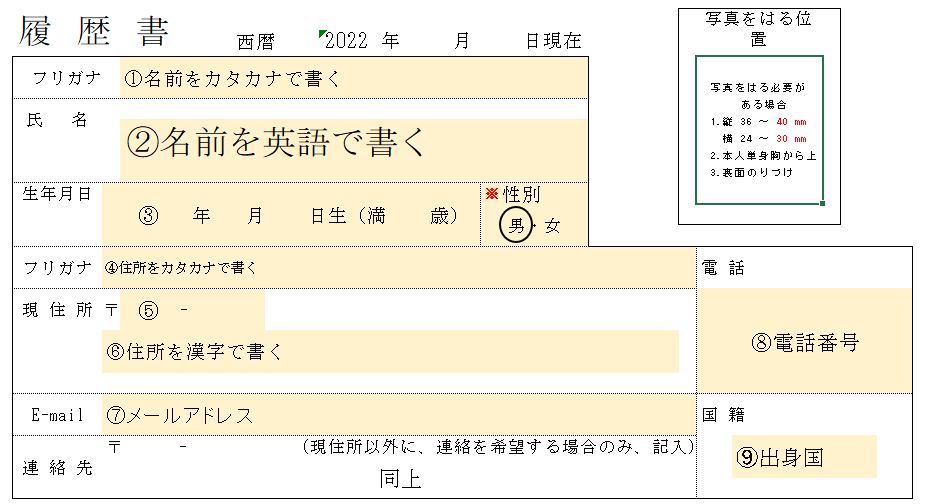
① Furigana
Write your name in katakana.
Some people write their name in hiragana, but here we will write it in katakana.
The usage of hiragana and katakana of furigana is as follows.
ふりがな:じょんすみす (ふりがながひらがな=名前もひらがなで書く)
フリガナ:ジョンスミス (フリガナがカタカナ=名前もカタカナで書く)
② Name
Write it exactly as it appears on your residence card or passport.
③ Date of birth
Write the date of birth in the Western calendar.
The Japanese calendar is also acceptable, but the Western calendar is generally used.
〇 1990年10月20日 ←It is recommended to write in the Western calendar.
× 平成2年10月20日 ←Western calendar is better than Japanese calendar such as 平成×年
④ Address (Furigana)
Write the address in katakana.
As above, look at the ふりがな/フリガナ and write the address in hiragana or katakana.
⑤ Postal Code
Write the 7-digit postal code (〒123-4567).
The zip code is written on the residence card.
If you want to look it up on the Internet, you can do so here.
https://www.post.japanpost.jp/index_en.html
⑥ Address
Write your address in Kanji characters.
⑦ E-mail address
Write your e-mail address where company can contact you.
⑧ Telephone number
Write down the telephone number where you can be reached.
⑨Nationality
Write down the country of citizenship.
☆Photo for Resume Application☆
The photo is the most important thing. Use a photo in a suit (with shirt and tie) or formal attire.
Personal attire or clothing that is not appropriate for a resume is not acceptable.
Education and Work Experience
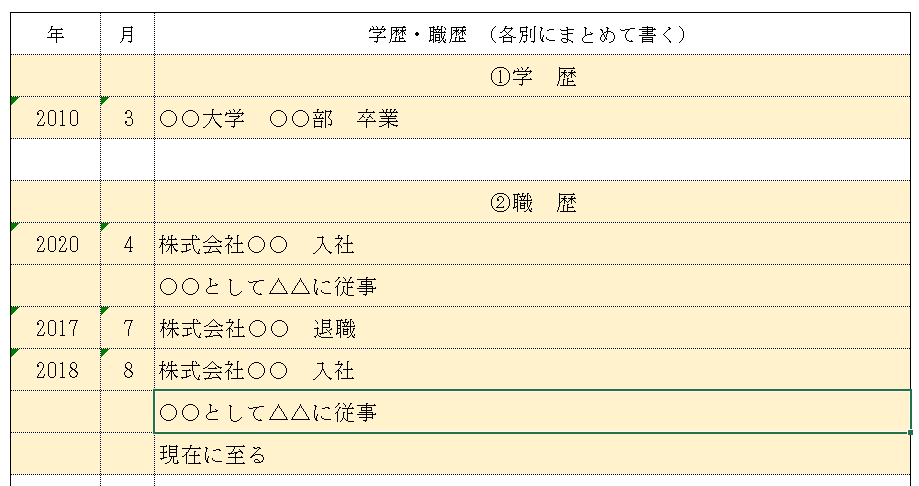
① Academic background
For your educational background in your home country, you only need to write your final educational background (university degree).
Write the year and month of graduation, the university from which you graduated, and the major of your study.
If you attended a university, vocational school, or Japanese language school in Japan, please write that as well.
② Work history
The employment history should include the company you joined and the company you left.
If possible, it would be better if you write what kind of position you held and what kind of work you did at the company.
(例)機械設計として自動車部品設計に従事
Engaged in designing automobile parts as a mechanical designer
Detailed job descriptions are written in the skill sheet(職務経歴書), so it is not absolutely necessary to include them here.
To write or not to write is up to you.
When you come to a Japanese company from a foreign company, you should write like this.
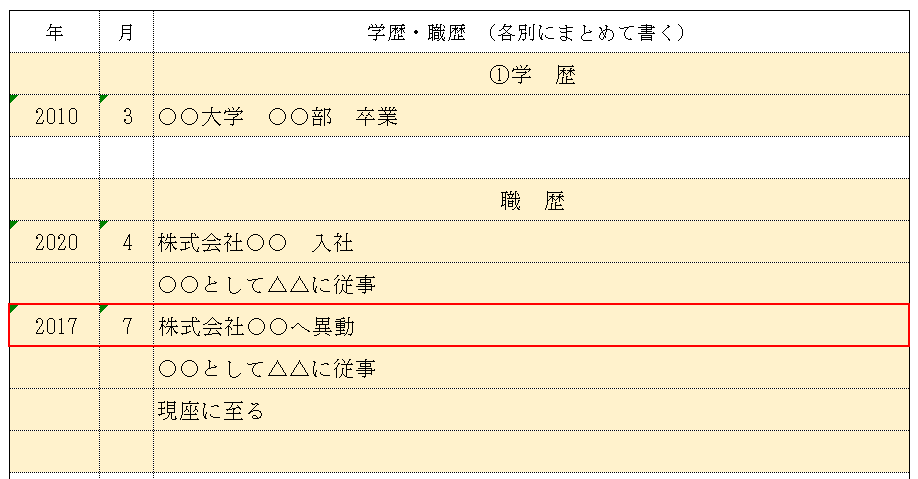
You can write 株式会社○○へ異動、
Licenses and Certifications
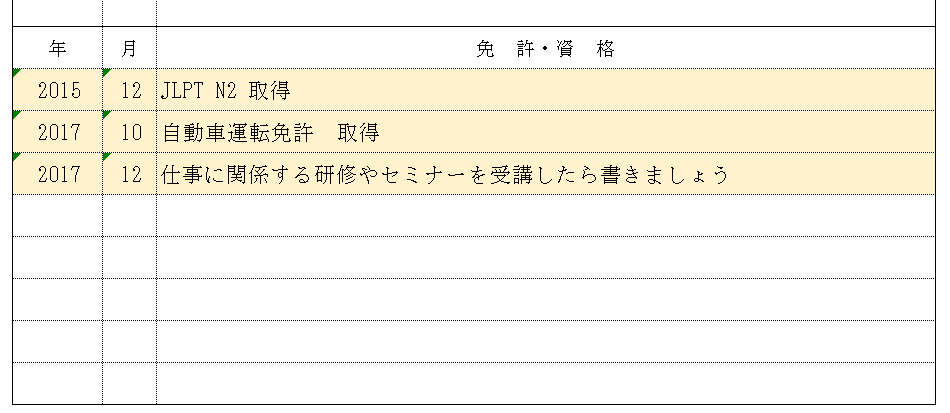
Here, you can show your qualifications that can be applied to your job and the knowledge you have learned in training sessions and seminars.
Please write about your qualifications such as JLPT, TOEIC, CAD, IT Passport, and so on.
Reason for application
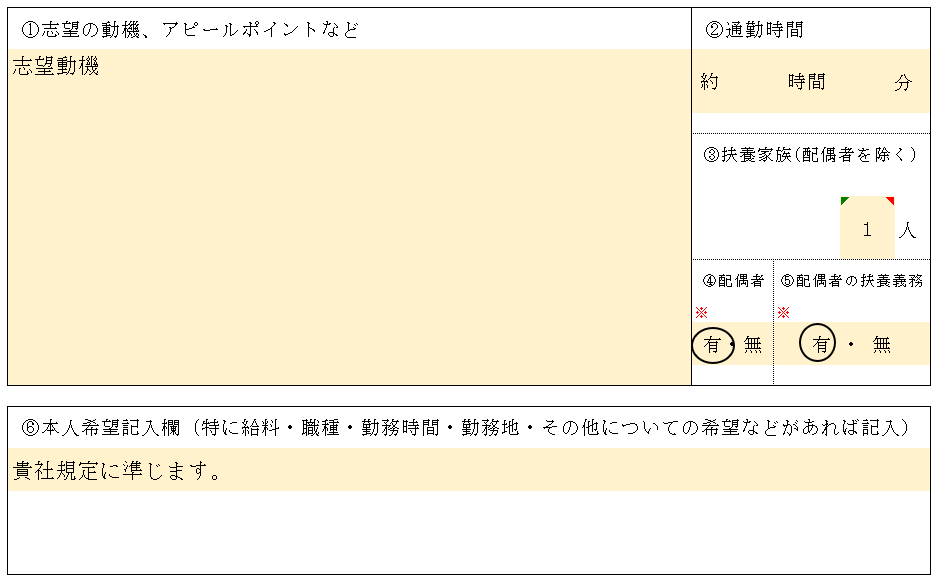
① Reasons for applying, points that appeal to you, etc.
Write the reason why you applied to this company. Also, write what you can contribute to the company.
Please refer to the following examples of motivation for application.
【ITエンジニアの場合】
これまで5年間Androidの開発を経験してきました。
I have 5 years of experience in Android development.
(あなたの国)で開発職に従事した後、以前より興味があった日本へ2020年1月に来日し、言語学校で日本語の勉強をしました。
After working as a developer, I came to Japan in January 2020, which I had been interested in for some time, and studied Japanese at a language school.
将来はMobile エンジニアになることを目指すために、常に新しい技術とツールを積極的に学び、習得しております。
In order to become a mobile engineer in the future, we are always actively learning and acquiring new technologies and tools.
この経験を活かして貴社に貢献したいと思い、志望致しました。
I would like to contribute to your company by making use of this experience.
【設計エンジニアの場合】
これまで7年間、AutoCADやCATIA V5を使用して自動車部品を設計してきました。
I have been designing automotive parts using AutoCAD and CATIA V5 for 7 years.
現在はマネジャーとしてプロジェクトを管理したり、エンジニア育成を担当しております。
Currently, I am a manager in charge of managing projects and training engineers.
貴社では様々な部品を設計しており、私自身も自動車部品だけでなく様々な部品を設計しキャリアアップしたく、志望致しました。
I am applying for this position because your company designs a wide variety of parts and I would like to improve my career by designing not only automotive parts but also a wide variety of other parts.
② Commuting time to work
Write the commuting time from your home to the company you applied for.
If you are not sure, you may leave it blank.
③ Dependents (excluding spouse)
This section describes the persons who are dependent on your income.
To put it simply, the number of children you have.
Spouses (husband and wife) are not included.
For example, if your family structure is
You
Your wife
2 children
then you have 2 dependents (your children).
④ Spouse
Indicate whether or not you have a spouse.
For simplicity, check (Yes) if you are married and (No) if you are unmarried.
⑤ Spousal Support Obligation
This section describes whether or not you are obligated to provide support to your spouse.
Simply put, is your wife (husband) working part-time or not?
For example, if your spouse works less than 100 hours per year as a part-time worker and does not pay health insurance, you are obligated to support your spouse (Yes).
On the other hand, if your spouse works as a full-time employee and the company deducts social insurance, etc., then the spousal support obligation is (no).
⑥ Personal Preference Entry Form
Write down what you are hoping to do.
Write your desired location, desired department, desired job, etc., but do so with an attitude of asking for help.
One thing you should not write too much about is your annual salary.
If you write, “My desired annual salary is 5 million yen,” it does not reflect well on you and may result in rejection.
Annual salary is determined by the company based on your market value, skills, experience, and comparison with other companies.
Of course, annual income is the most important factor, but you will be asked about it at the interview, so you should talk about it there.
Please note that if you mention your annual income during the document screening process, you will be rejected during the document screening process and will not even be able to proceed to the interview in the first place.
Summary
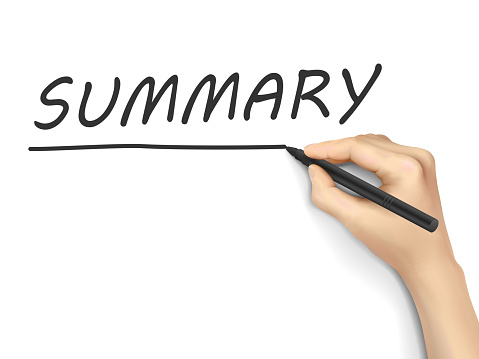
There is no prescribed format or correct way to write a resume.
However, if you cannot write a resume, it may be assumed that you cannot write documents properly, that you do not have good Japanese manners, or that you cannot write reports.
In that case, it will be judged that you do not have general common sense, and you will not be hired in the document screening.
A resume is an important document to advance to an interview, so to speak, it is a ticket to an interview.
If you want to pass the application screening and proceed to the interview, have a Japanese person check your application.
We not only introduce job openings, but also prepare application documents.
If you need assistance with your job search, please contact us.

